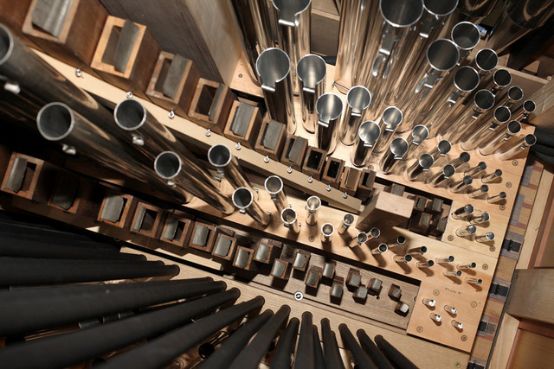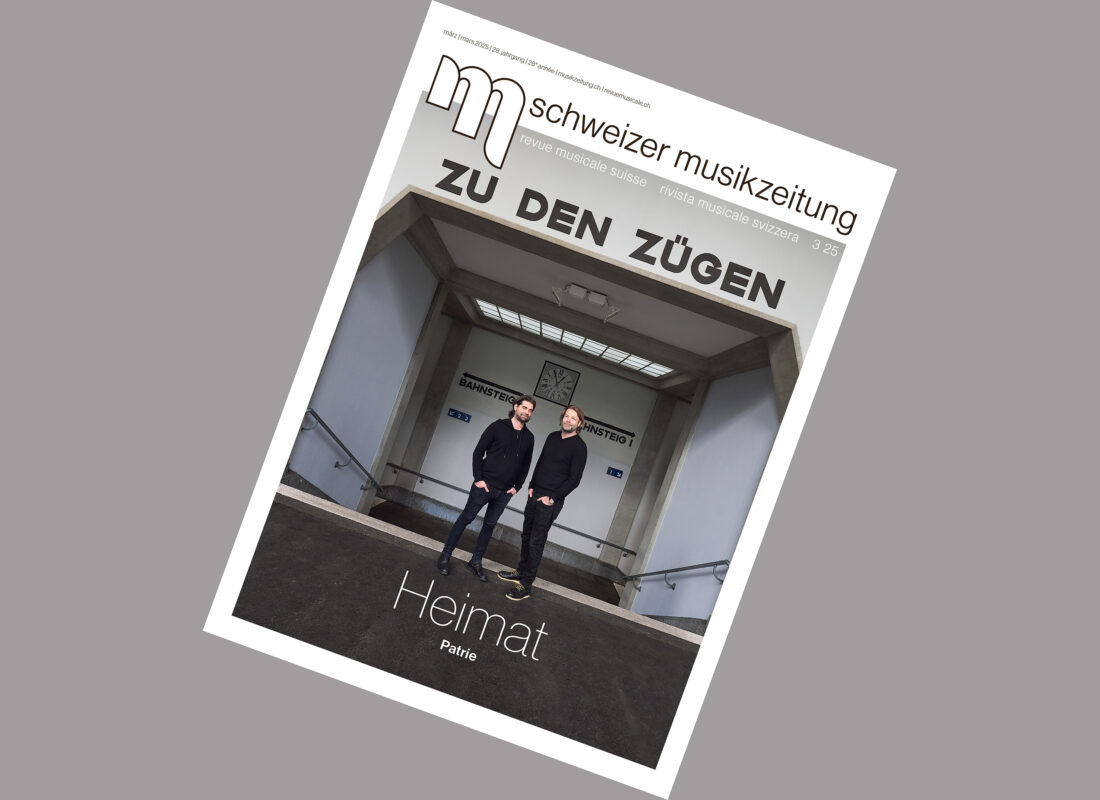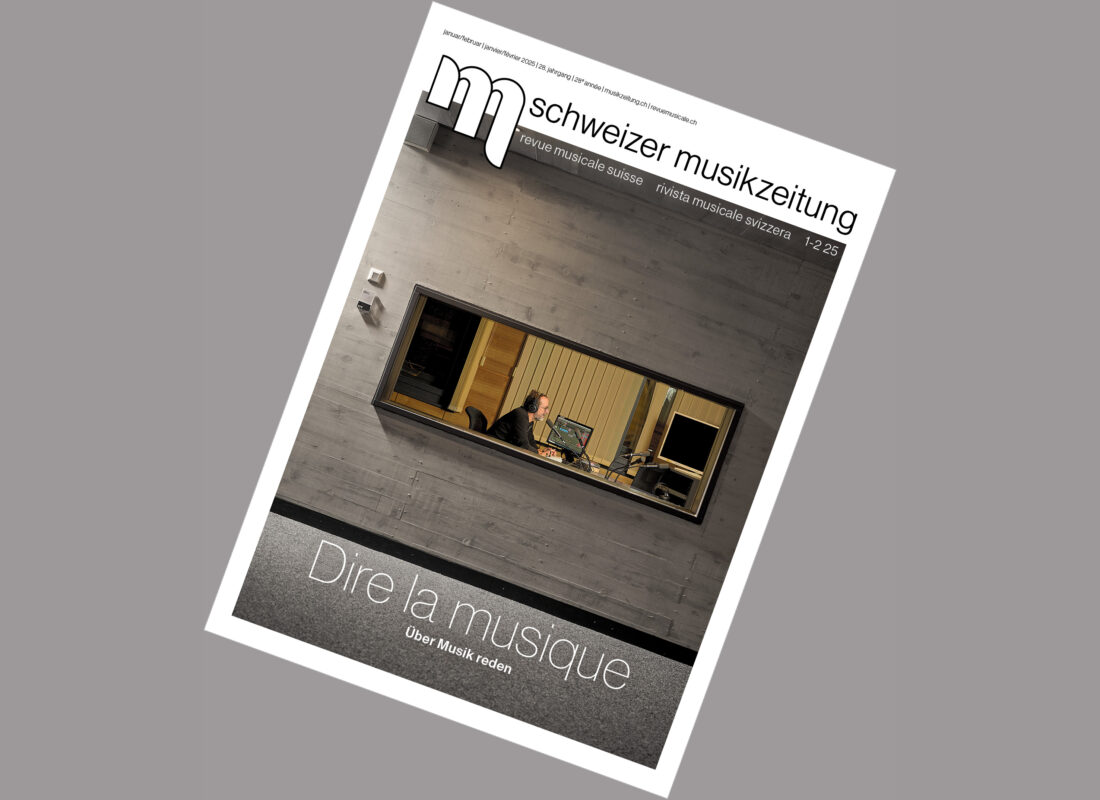Get into church music!
With the help of a competition, the Zurich churches and the ZHdK are looking for ideas for music in church services and churches. The competition is open to musicians of all genres, including amateurs and students. The closing date for entries is March 31, 2016.


With the help of a competition, the Zurich churches and the ZHdK are looking for ideas for music in church services and churches. The competition is open to musicians of all genres, including amateurs and students. The closing date for entries is March 31, 2016.
The Catholic and Reformed Churches of the Canton of Zurich, together with the Zurich University of the Arts (ZHdK), are organizing the competition "Sound & Glory" for church music. Two presentations are required, which must be uploaded as a video by March 31, 2016 to www.klangundgloria.ch. Musicians from all genres are invited to take part, as are amateurs and students. With the competition, the initiators want to draw attention to the "diverse artistic and professional opportunities in church music."
Beat Schäfer, Head of Church Music at the ZHdK and jury president, answers a few questions to shed some light on the background to this competition.
SMZ: Reading the competition announcement gives the impression that there are too few aspiring female musicians who specialize in church music. Is that the case?
Beat Schäfer: In terms of supply and demand, that's true. A survey of over 170 parishes commissioned by the Reformed Church of the Canton of Zurich in 2008 in connection with the new personnel regulations showed, for example, that a quarter of all organists active in 2008 would be of retirement age by 2014/15. This is now the case. On average, however, only around three organ students have completed their Master's degree in recent years. It should be noted that the ZHdK by no means only trains musicians for the Canton of Zurich! In fact, we currently have a year without a single Bachelor's organ student. However, the DAS course (organ C course for experienced amateurs or pianists who play the organ as a sideline) is quite well attended. The situation is somewhat better for choir conductors in church music (around four graduates per Master's course). The currently discussed reduction in congregations (as a result of declining church membership) is also not taking place to the same extent as the current decline in student numbers. The new continuing education course "Church Music Pop and Jazz" is just starting (third course year).
Isn't it more the case that church music is booming? I'm thinking, for example, of the major church music festivals Cantars 2011 and 2015, the Bern Church Music Congress at the end of October or the church music symposium as part of the 1st Mendelssohn Days in Aarau.
It is certainly the case that these events have a positive impact. And there is also a lot of positive content to report. With this in mind, those responsible for the "Klang & Gloria" church music competition are hoping for equally positive impulses both externally (in the media) and internally (in the churches). However, one must be aware of the special event character of these events. Their organization was professional, and the aforementioned events were well received by the media. However, all three were one-off events that are only possible every few years, but which, despite their high profile, represent an important part of church music production, albeit only a part. The Church Music Congress in Bern, for example, never claimed to be representative of "nationwide" church music, but rather wanted to provide impulses that would (hopefully) have a broad impact. In this respect, some important productions were not performed by congregational ensembles, but by institutions outside the church (high school choirs, university choir, Südwestfunk chamber choir, HKB students).
Or, despite the overwhelming response to Cantars - which I am very pleased about - I could easily list over 100 parishes in the Canton of Zurich alone, Catholic and Reformed, that were unable or unwilling to send a choir, band, organist or church musician to Cantars or the events in Bern or Aarau.

- Photo: ZHdK
- Beat Schäfer at the inauguration of the organ in the new organ hall of the ZHdK
Does church music need a new image?
I think that the image, the reputation of something like church music, is always changing and can even be contradictory in the breadth of our society, depending on the person, time and place. The "image" is partly really to do with the subject matter of church music, but also with the person making the assessment (with their experiences, standards of value) and also partly with the environment (for example the image of the church as a whole).
However, a "false" image - or perhaps it is better to speak of a cliché - is often slow to change because you always find places that confirm such entrenched prejudices ("fewer people sing in church choirs, especially old people", "the music is too one-dimensional and stylistically too narrow", "church music speaks a language that is outdated" etc.).
Church music is fundamentally something very dynamic, i.e. both powerful and moving and self-moving. Church music therefore always has different facets. Four aspects should illustrate this dynamic:
1. church music is part of our western musical culture, which deals with the pastbecause it is part of a tradition (of the Bible, of the church, but also of traditional [church music] practices). It is itself often a product of an earlier culture. Through their performance, musical works are passed on as art forms and treasures that can inspire, comfort, delight or challenge just as much today as in the past. At the same time, it bears witness to past or still current rites. Precisely because this church music carries valuable treasures of the past into the present, it must ensure that it does not degenerate into a pretext for arguments for old, rigid structures and outdated beliefs.
2. church music is part of today's culture and is constantly reinventing itselfbecause it takes place today and has to be current: it deals simultaneously with today's concerns, today's language and today's forms of expression, life and faith content. Church music that is not also current, newly created and meaningful today would only be a museum deposit.
3. church music is beyond their proclaiming, eulogizing, rousing or soothing function of comforting the individual listener, also community-buildingThis is achieved not only by bringing together listeners with similar interests, but also by being part of a community action, or by forming and promoting community, e.g. in congregational singing, choral singing, making music at open singing events, in a community orchestra or a church band.
4. church music is - detached from its intrinsic value - by its nature as worship music always also Partner of the word The interplay of the spoken word, the biblical or divine word and this interplay. Where this interplay is successful, it always leads to added value for both sides.
For me, all four aspects are essential to the essence of lively church music in the congregation, in the church, or to the positive impact of church music in secular society.
Why are new ideas needed?
As described above, it is part of the nature of church music (I think of any art!) that it is constantly being "reinvented" - even when interpreting "old models/scores". For church music, there is also something of an inner program from tradition not to stand still through words from the Bible such as Psalm 96 Sing unto the Lord a new song or the Reformation declaration that the church must always be an "ecclesia semper reformanda" (to which the Catholic Church also clearly professes with its councils).
Perhaps your new ideas address the openness of the artistic means of expression in the competition (wording of the call for entries: "Whether rap, dance, classical or pop performance, whether words and music in free combination, composed, arranged or improvised - we are looking forward to your ideas!) We are of the opinion that "harmonious" or "incongruous" church music can be made with all stylistic means and hope that the competition will naturally lead to many successful realizations of good ideas, but also that, in addition to aspiring or "established" church musicians, people who otherwise come "from a different corner" will also apply.
In which direction could/should church music move?
For me, the direction has never really changed significantly in all my years of professional experience: Towards people, towards immediacy, towards great authenticity, towards convincing artistic or artisanal work, towards more urgency and, in church services, towards liturgical coherence; correspondingly less towards decoration, arbitrariness, wellness sound, sacral background noise.
Isn't the problem in many places in the structures or at the roots?
Certainly. In addition, in customs or simply in ignorance of what church music can do more than just spread a good mood.
Are parishes not financially able or willing to employ well-trained musicians on reasonable terms?
In the canton of Zurich, where this competition was launched, the employment conditions for professional church musicians in both the Catholic and Reformed churches range between the salary of a primary school teacher and a secondary school teacher (depending on the level of training and area of responsibility). The operating resources vary, depending on the church music formations or music offerings, as does the teamwork depending on the staffing of the various responsible persons (including church musicians).
On the other hand, the congregation and the liturgist often expect nothing more from the music than the "embellishment" of the service.
Yes, unfortunately that still happens in some places. This is very often also due to the lack of appropriate training for liturgists, and sometimes also to a lack of understanding of their role.
Rarely are there church musicians (often those without a background in church music) who, whether ignorant, resigned or taking the path of the easiest resistance (or effort), are only concerned with the pleasant sound of the congregation, detached from the content and the tension of a church service.
It is precisely because it would be a great loss if, in future, more and more musicians had to be deployed for worship tasks who are unfamiliar with the content, form and meaning of the various worship services, who do not have a corresponding variety of stylistic expressions at their disposal and who do not also see themselves as serving to build up the congregation, that it is important to keep introducing people to this exciting profession and these diverse tasks. This competition is intended to be one impulse among many towards this goal.








